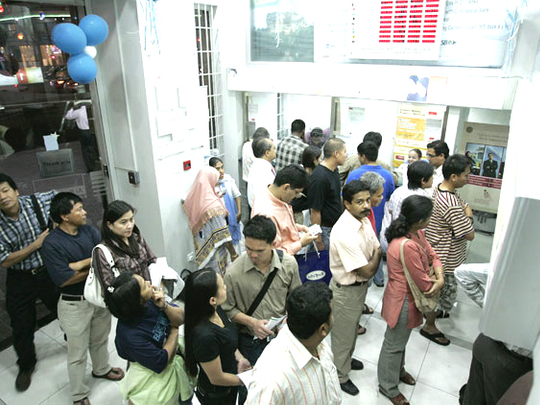
Dubai: The recent increase in the cost of money transfers from the UAE will not affect the majority of expatriates who make a beeline at exchange houses every payday.
Remittance service providers in the UAE have recently increased their transaction charges by Dh1 to Dh2, depending on the amount sent.
The cost for transfers worth more than Dh1,000 increased from Dh20 to 22, while charge for smaller amounts inched up from Dh15 to Dh16.
A senior official with a major exchange house in the UAE, however, has clarified that charges for the traditional cash-to-cash remittance service, usually coursed through operators like Western Union, have not increased.
Increase only credit-to-bank remittances
The latest adjustments are only applicable to customers who forward funds to bank accounts, an option rarely used by low-to-average income earners.
“Less than 50 per cent of the market [send money to bank accounts],” said Sudhesh Giriyan, COO of Xpress Money.
“A significant part of the UAE’s working population [especially blue-collar expats] prefers to send cash transactions [hence they’re not affected].”
Data from the World Bank also showed that money transfer fees in the UAE are lower than what most countries in other markets are charging.
The new Dh22 fee, for example, only represents less than 2 per cent of the transferred funds, much lower than the global average.
“UAE continues to be one of the most affordable in terms of cost of remittances. Even with this marginal increase in the fees, it will [still] be one of the [least costly] countries for sending remittances,” Giriyan pointed out.
UAE’s remittance prices are still one of the lowest in the world, according to World Bank data
Cost of remittance in other countries
According to the World Bank, sending remittances from most source market today can eat approximately 7.45 per cent of the wired cash.
In some places, the service charge can cost ten-fold more than what UAE expats are paying.
The UAE’s remittance costs pale in comparison to those of South Africa, where wiring less than Dh1,000 could set a sender back approximately Dh150, or about 20 per cent.
“South Africa remains the costliest [G20 economy] to send remittances from, and this is in spite of an overall decrease from its peak in [the first quarter of 2013,” the World Bank said.
Competition keeps charges to a minimum
Giriyan said remittance service providers in the UAE have kept their service charges to a minimum due to competition, and to avoid burdening the blue-collar workers who comprise a huge chunk of the wire transfer market.
These migrants not only send money home regularly, they transact with very low amounts, at approximately $300 on average.
As to why the cost of bank transfers has inched up, Giriyan said that businesses need to cope with the rising operational costs.
“Money transfer operators continue to invest heavily in compliance and technology infrastructure. This led to a collective need to increase the cost, to cater to the evolving customer needs and keep up with the increasing cost.”







